Abstract
1. We have studied the peptic responses of the intact human stomach to stimulation by doses of pentagastrin which elicit a maximal acid response.
2. In twelve patients an intramuscular injection of pentagastrin (6 μg/kg) was followed by a prompt increase in acid output which attained a peak value eight times higher than the basal value in the period 15-30 min after stimulation. The pattern of the peptic response was similar, but the peak output of pepsin was only three times the output in unstimulated juice.
3. In ten subjects the acid and peptic responses to I.V. infusion of pentagastrin (1·2 μg/kg per hr) were studied using a gastric perfusion technique with 14C-labelled polyethylene glycol as non-absorbable marker. In seven of these ten subjects the pH of duodenal contents exceeded 6, and less than 0·5 m-mole HCl per 15 min entered the duodenum throughout the tests. In this subgroup pentagastrin evoked a strong acid response but no peptic response.
4. In three subjects the pH of duodenal juice was less than 5·5 at times when more than 1 m-mole HCl per 15 min entered the duodenum. The acid response to pentagastrin differed considerably in the three subjects, but in each individual the output of pepsin increased each time an excess of HCl entered the duodenum.
5. Since pentagastrin infused in a dose which maximally stimulates acid did not significantly increase the output of pepsin provided no HCl entered the duodenum we conclude that pentagastrin does not stimulate the secretion of pepsin in man. The transient insignificant peptic response to pentagastrin infusions, and the small but significant response to bolus injections of pentagastrin, can be explained as a wash-out phenomenon.
Full text
PDF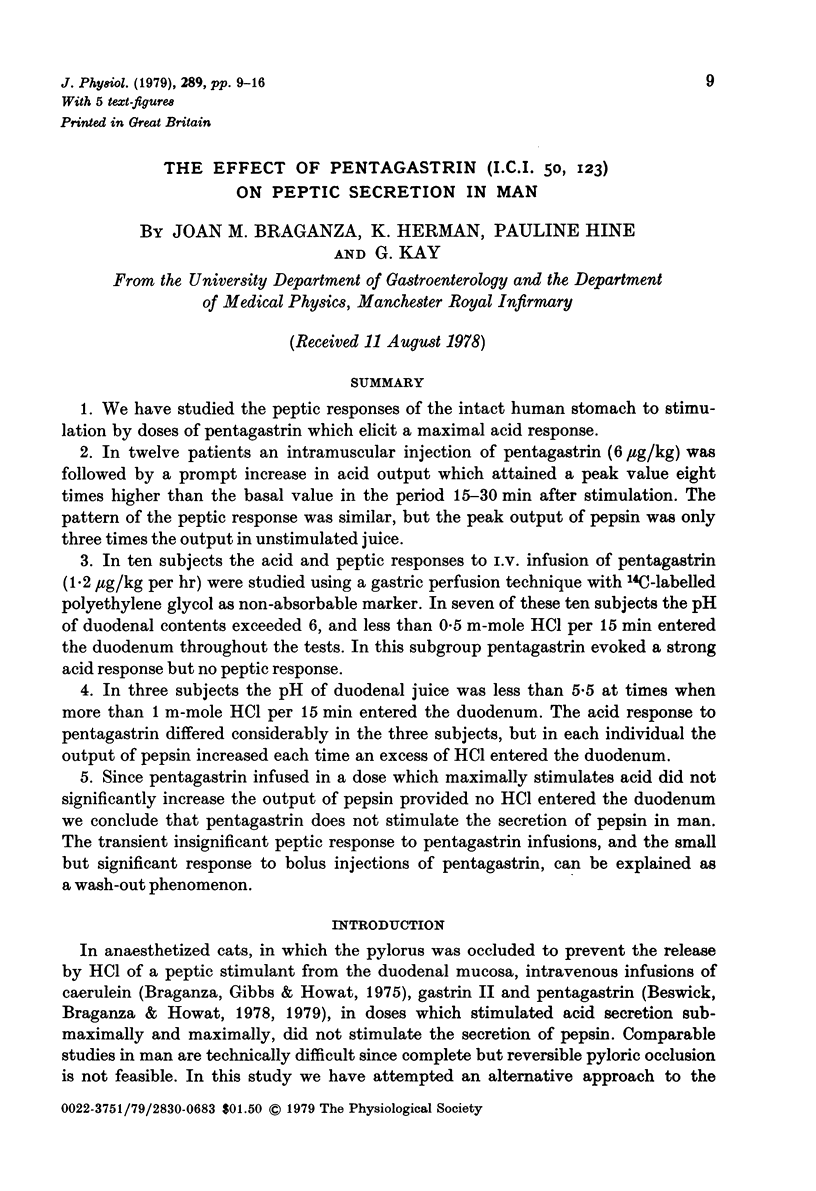
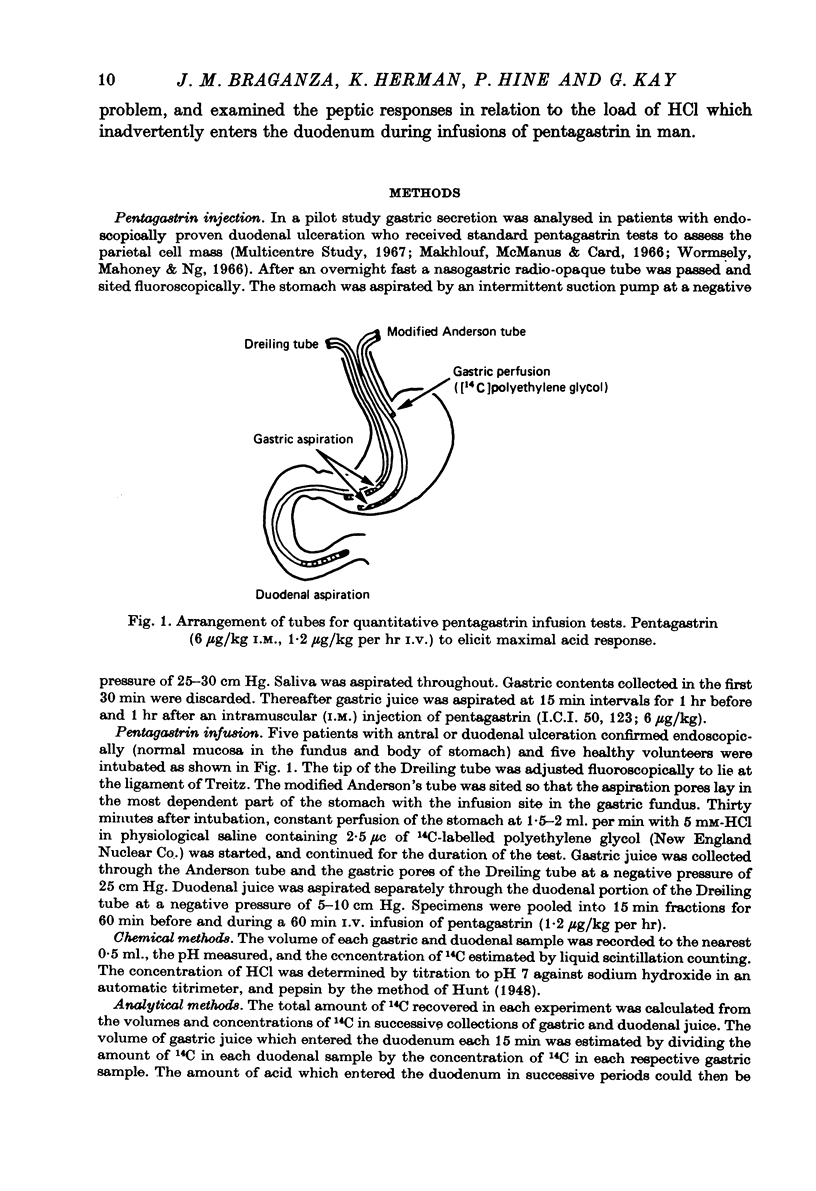
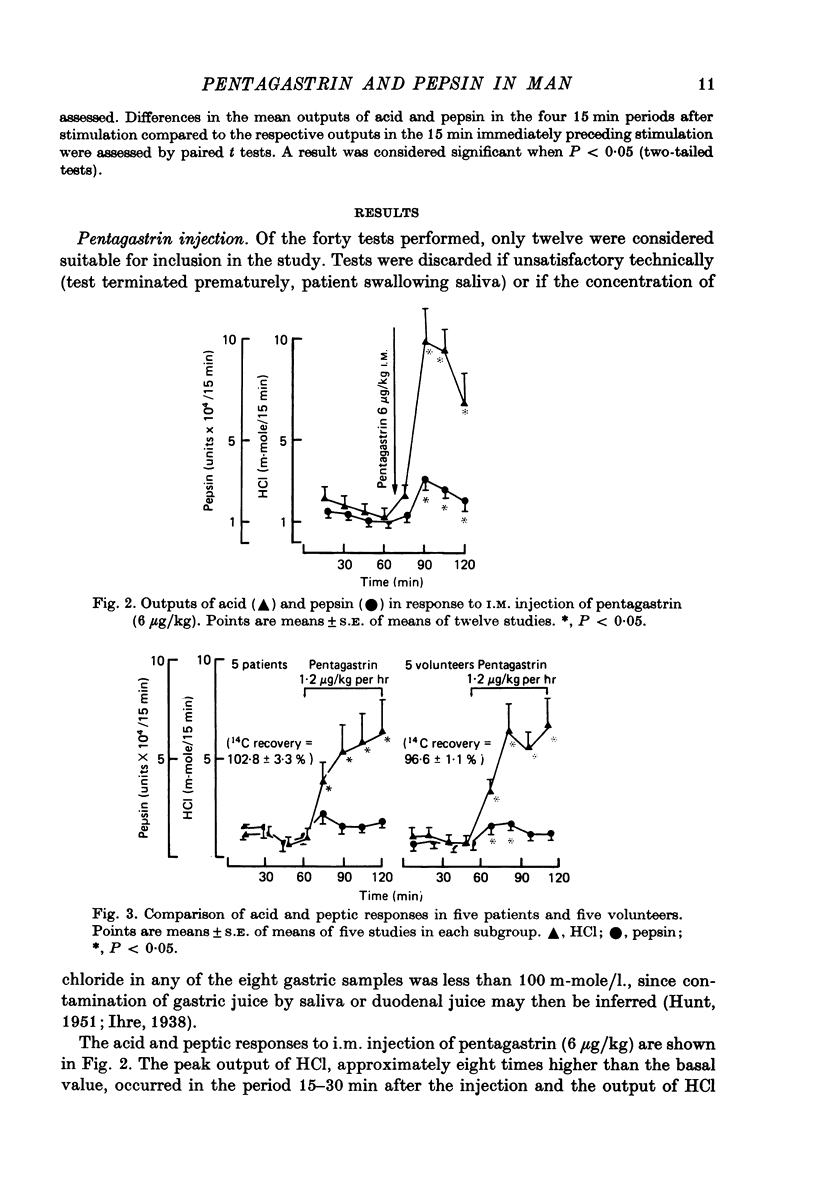
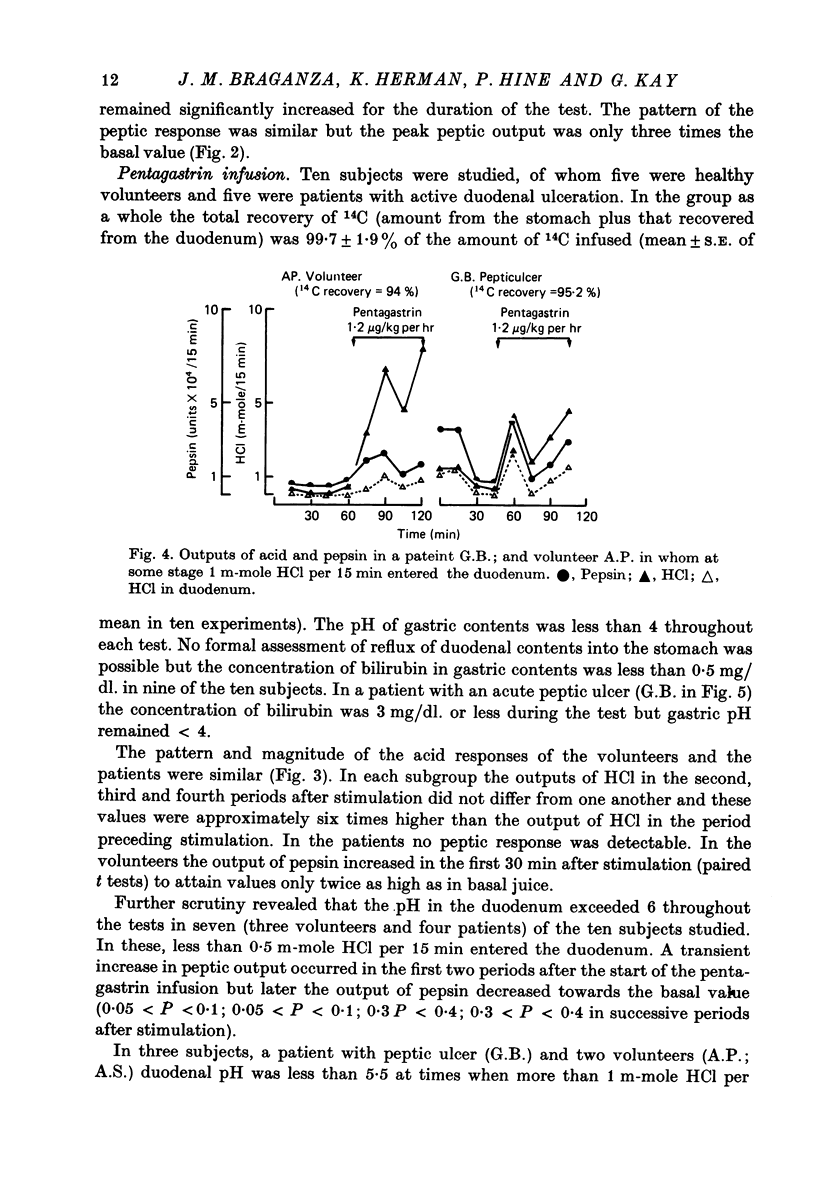
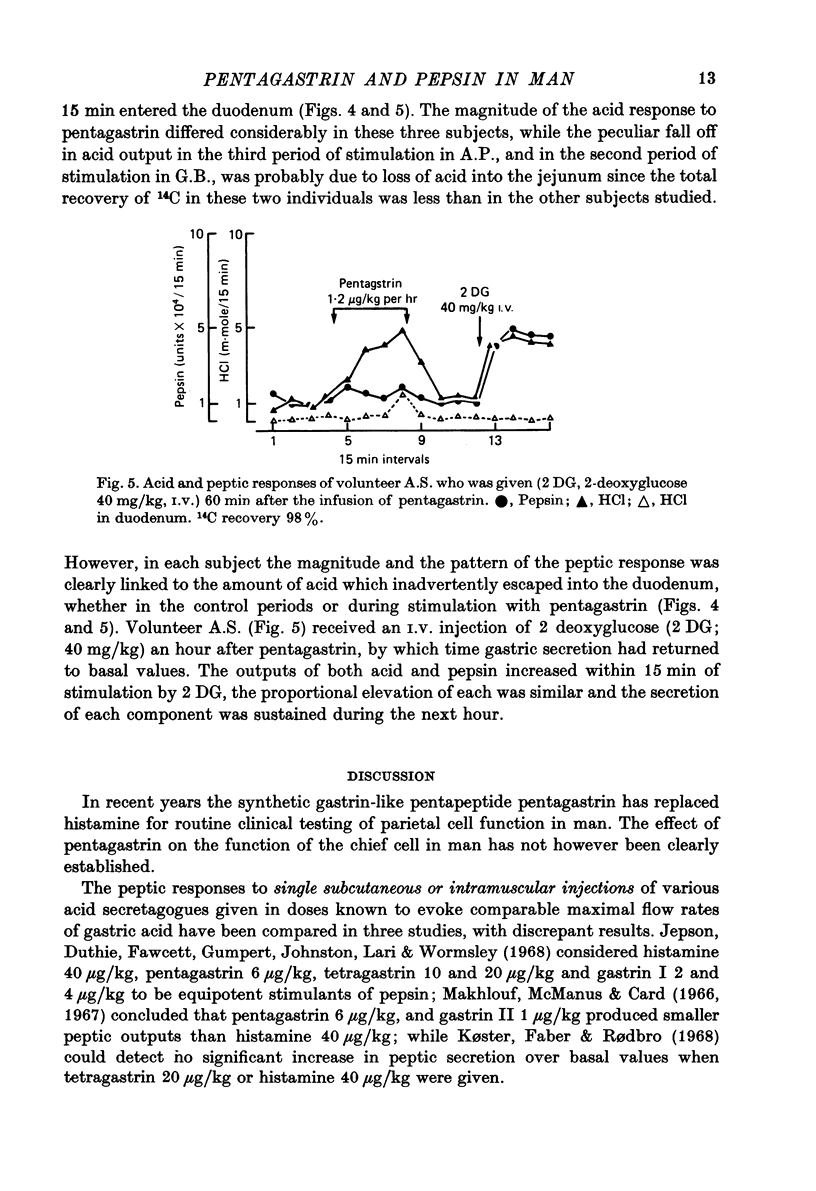
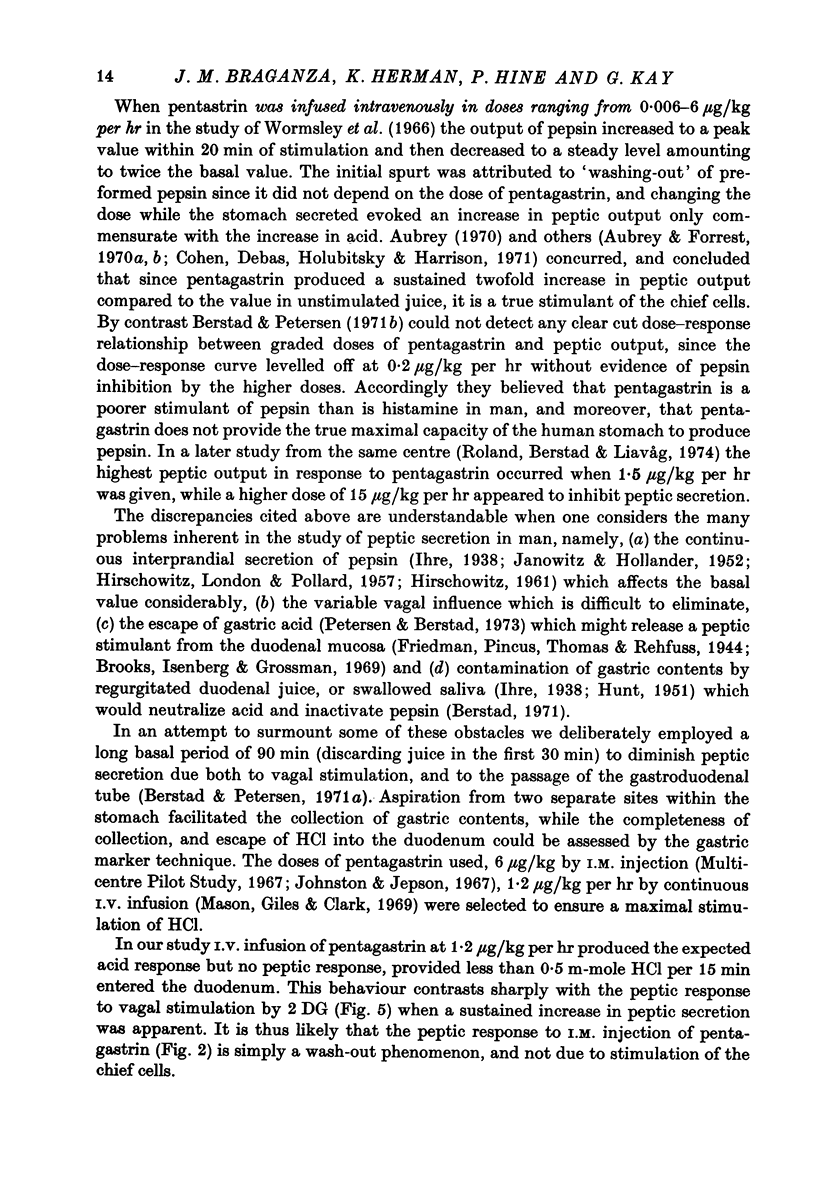
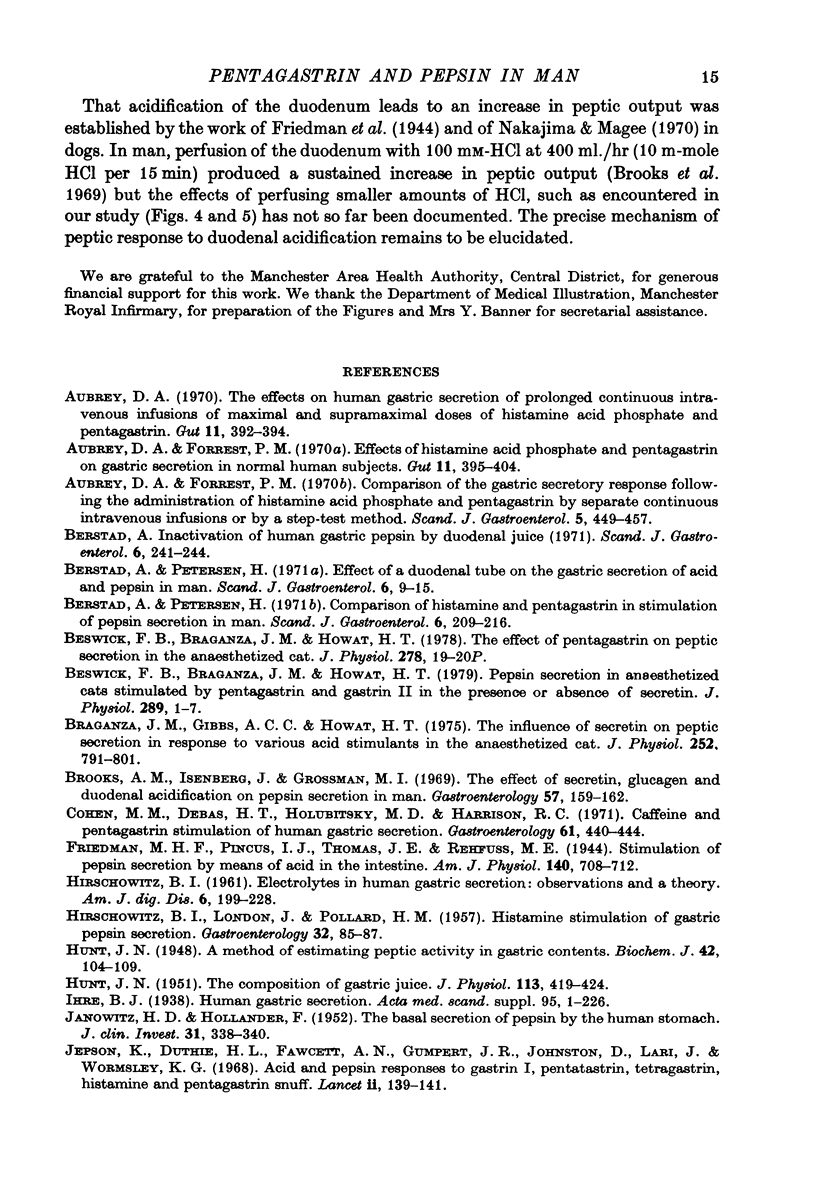
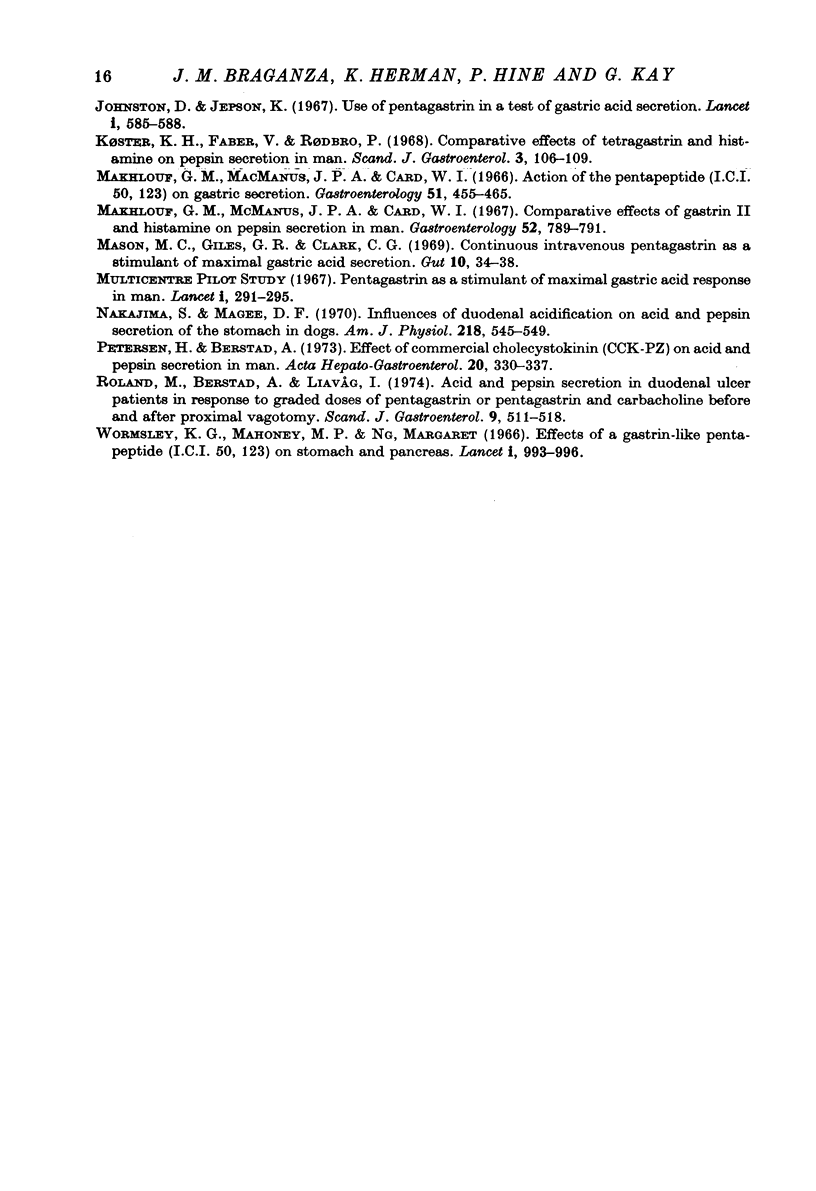
Selected References
These references are in PubMed. This may not be the complete list of references from this article.
- Aubrey D. A., Forrest A. P. Comparison of the gastric secretory responses following the administration of histamine acid phosphate and pentagastrin by separate continuous intravenous infusions or by a step-test method. Scand J Gastroenterol. 1970;5(5):449–457. [PubMed] [Google Scholar]
- Aubrey D. A. The effects on human gastric secretion of prolonged continuous intravenous infusions of maximal and supramaximal doses of histamine acid phosphate and pentagastrin. Gut. 1970 May;11(5):392–394. doi: 10.1136/gut.11.5.392. [DOI] [PMC free article] [PubMed] [Google Scholar]
- Berstad A. Inactivation of human gastric pepsin by duodenal juice. Scand J Gastroenterol. 1971;6(3):241–244. doi: 10.3109/00365527109180700. [DOI] [PubMed] [Google Scholar]
- Berstad A., Petersen H. Comparison of histamine and pentagastrin in stimulation of pepsin secretion in man. Scand J Gastroenterol. 1971;6(3):209–216. doi: 10.3109/00365527109180695. [DOI] [PubMed] [Google Scholar]
- Berstad A., Petersen H. Effect of a duodenal tube on the gastric secretion of acid and pepsin in man. Scand J Gastroenterol. 1971;6(1):9–15. doi: 10.3109/00365527109180662. [DOI] [PubMed] [Google Scholar]
- Beswick F. B., Braganza J. M., Howat H. T. Pepsin secretion in anaesthetized cats stimulated by pentagastrin and gastrin II in the presence or absence of secretin. J Physiol. 1979 Apr;289:1–7. doi: 10.1113/jphysiol.1979.sp012720. [DOI] [PMC free article] [PubMed] [Google Scholar]
- Beswick F. B., Braganza J. M., Howat H. T. The effect of gastrin II and gastrin pentapeptide on peptic secretion in the anaesthetized cat [proceedings]. J Physiol. 1978 May;278:19P–20P. [PubMed] [Google Scholar]
- Braganza J. M., Gibbs A. C., Howat H. T. The influence of secretin on the secretion of pepsin in response to acid stimulants in the anaesthetized cat. J Physiol. 1975 Nov;252(3):791–801. doi: 10.1113/jphysiol.1975.sp011170. [DOI] [PMC free article] [PubMed] [Google Scholar]
- Brooks A. M., Isenberg J., Grossman M. I. The effect of secretin, glucagon, and duodenal acidification on pepsin secretion in man. Gastroenterology. 1969 Aug;57(2):159–162. [PubMed] [Google Scholar]
- Cohen M. M., Debas H. T., Holubitsky I. B., Harrison R. C. Caffeine and pentagastrin stimulation of human gastric secretion. Gastroenterology. 1971 Oct;61(4):440–444. [PubMed] [Google Scholar]
- HIRSCHOWITZ B. I. Electrolytes in human gastric secretion. Observations and a theory. Am J Dig Dis. 1961 Mar;6:199–228. doi: 10.1007/BF02283955. [DOI] [PubMed] [Google Scholar]
- HIRSCHOWITZ B. I., LONDON J. L., POLLARD H. M. Histamine stimulation of gastric pepsin secretion in man. Gastroenterology. 1957 Jan;32(1):85–87. [PubMed] [Google Scholar]
- HUNT J. N. The composition of gastric juice. J Physiol. 1951 May;113(4):419–424. doi: 10.1113/jphysiol.1951.sp004584. [DOI] [PMC free article] [PubMed] [Google Scholar]
- JANOWITZ H. D., HOLLANDER F. The basal secretion of pepsin by the human stomach. J Clin Invest. 1952 Mar;31(3):338–340. doi: 10.1172/JCI102612. [DOI] [PMC free article] [PubMed] [Google Scholar]
- Jepson K., Duthie H. L., Fawcett A. N., Gumpert J. R., Johnston D., Lari J., Wormsley K. G. Acid and pepsin response to gastrin I, pentagastrin. tetragastrin, histamine, and pentagastrin snuff. Lancet. 1968 Jul 20;2(7560):139–141. doi: 10.1016/s0140-6736(68)90421-2. [DOI] [PubMed] [Google Scholar]
- Johnston D., Jepson K. Use of pentagastrin in a test of gastric acid secretion. Lancet. 1967 Sep 16;2(7516):585–588. doi: 10.1016/s0140-6736(67)90739-8. [DOI] [PubMed] [Google Scholar]
- Koster K. H., Faber V., Rodbro P. Comparative effects of tetragastrin and histamine on pepsin secretion in man. Scand J Gastroenterol. 1968;3(1):106–109. doi: 10.3109/00365526809180108. [DOI] [PubMed] [Google Scholar]
- Makhlouf G. M., McManus J. P., Card W. I. Comparative effects of gastrin II and histamine on pepsin secretion in man. Gastroenterology. 1967 May;52(5):787–789. [PubMed] [Google Scholar]
- Mason M. C., Giles G. R., Clark C. G. Continuous intravenous pentagastrin as a stimulant of maximal gastric acid secretion. Gut. 1969 Jan;10(1):34–38. doi: 10.1136/gut.10.1.34. [DOI] [PMC free article] [PubMed] [Google Scholar]
- Nakajima S., Magee D. F. Influences of duodenal acidification on acid and pepsin secretion of the stomach in dogs. Am J Physiol. 1970 Feb;218(2):545–549. doi: 10.1152/ajplegacy.1970.218.2.545. [DOI] [PubMed] [Google Scholar]
- Roland M., Berstad A., Liavåg I. Acid and pepsin secretion in duodenal ulcer patients in response to graded doses of pentagastrin or pentagastrin and carbacholine before and after proximal gastric vagotomy. Scand J Gastroenterol. 1974;9(6):511–518. [PubMed] [Google Scholar]
- Wormsley K. G., Mahoney M. P., Ng M. Effects of a gastrin-like pentapeptide (I.C.I. 50,123) on stomach and pancreas. Lancet. 1966 May 7;1(7445):993–996. doi: 10.1016/s0140-6736(66)90110-3. [DOI] [PubMed] [Google Scholar]


